Directions
Etymology is a curious thing. The way the meaning of the words change reflects on the countless milestones of the history our nations and civilizations. Yet, words have memories. They are what is left from our ancestors even if it takes a skill to recognize the signs.
Here, I’m referring to the phrase that exists in my native Ukrainian and in English. Yet, I admit, it is more commonly used in the place of my humble origins. Anytime we’re far from the sacred fire – another remnant of the shared Indo-European origins – of our homes, “I long for Lares and Penates” comes as a theme. Penates are a synonym of not just our dwelling, but the most quintessential attributes that make it a home.
Most of us know that Penates were household gods in ancient Rome, charged with insuring the continuous of life and prosperity. Roman families had figures of at least two Penates, kept near the hearth; as family dined, some food and wine went to the fire so the poor divinities would not starve and enlist a retribution to greedy humans. Yet, it is less known that Penates’ origin begun as gods of the pantry, “penus” in Latin. Taking into account close correlation between survival — for a long time that meant prosperity — and the content of the storeroom in the pre-around 200 BCE Rome, such connection raises no objections. And what any decent Roman would have in the pantry? Olive oil, wine, and, of course, sausages or dry meats. So, “returning to my Penates” actually means “I miss my sausages.”
With that in mind, I’ve created my own “Penates” sausage. To moderate my descent into despicable heresy, I’ve stopped in half. Instead of have two Penates, as any proper Roman should, I’ve adopted only one. Yet, it is the sausage, worth the efforts of always coming home…
Recipe:
Hand-cut neck: 2315 gr; rest of the minced shoulder: 5354gm. Total: 7669gr, 100% for the further calculations. Before the shoulder went to grinder, the meat received the blessings of salt, cure, and spices for 24 hrs in a refrigerator. Sea salt: 2.55%; cure#2: 0.25%; Black Pepper: 0.25%; Dried Sichuan Pepper: 0.7%: onion powder: 0.1%; 0.03% cardamom and the same amount of garlic powder. Since gods of old typically required some sort of libation, to please the “okie” deities, I’ve added some bourbon. The Bulleit Bourbon. The 10 years aged one. How could things go wrong after such sacrifice?
After the shoulder was processed through the grinder as a ritual form of oblation, I’ve added 0.3% of dextrose and F-LC cultures to insure that those invisible beings that come resurrect from being frozen in a vacuum have plenty of food and in their death, provide me with salvation from my own untimely demise from a food poisoning. Staffed into a beef bung, the mystery of fermentation was conducted under a simple press. The hand-cut neck did not go through the grinder. Then – three days of cold-smoke in pecan with just a bit of apple wood. What kinds of gods do not require an incense offering?
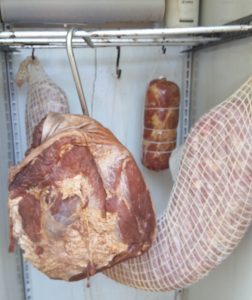
When my obligations to the Penates were completed, I simply had to wait five month to let the gods “do their thing” ; for some reason, divinity prefers the conditions under 55F and around 75% humidity. Yet, in comparison with what Huitzilopochtli asked from Aztecs, it’s not much…
Finally comes communion in which divine is consumed and becomes part of our flesh. In this case, the Penates transformed themselves in something soft, pungent, highly aromatic. Weight loss: 47%.
At the end, just one more instruction: unlike the Romans, don’t try not to address your God as a Great Sausage in liturgical settings. As a theologian by trade, I’d have to add a disclaimer. According to some religions, this would be a grave heresy and surely, the Holy Inquisition will be knocking on your door.
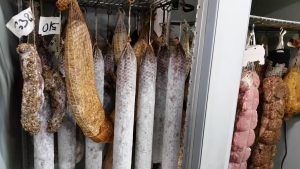
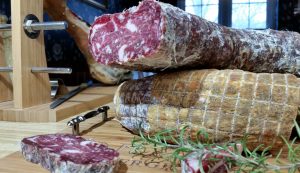
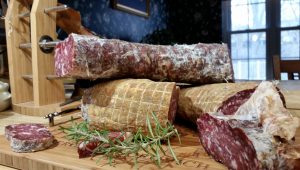


 Русский
Русский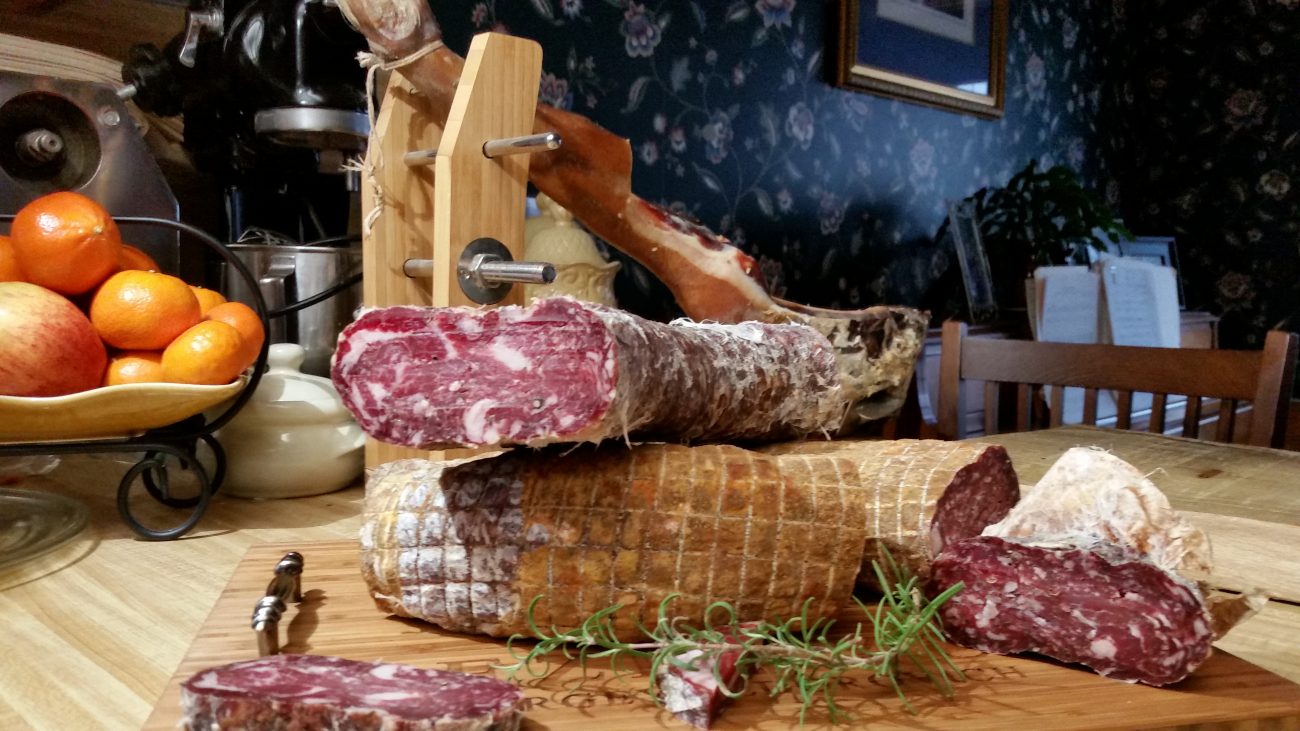



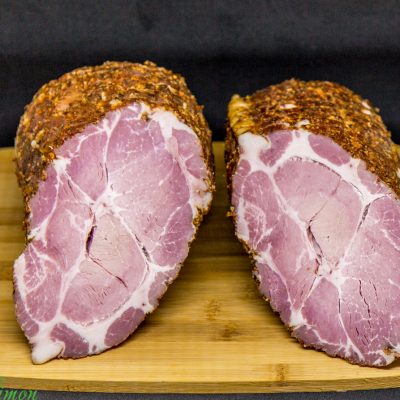
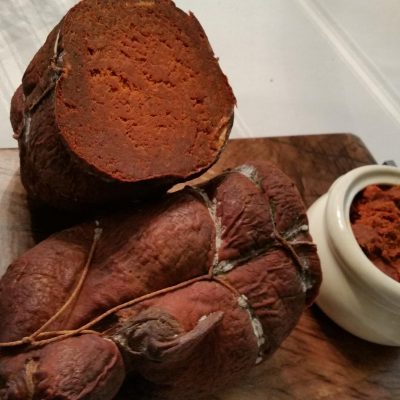
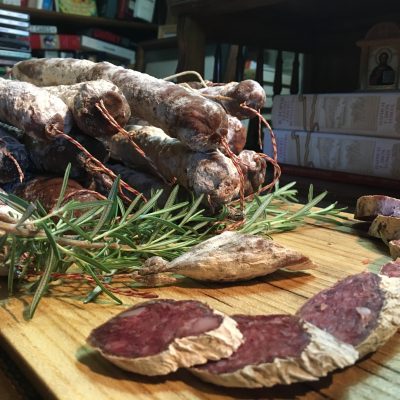
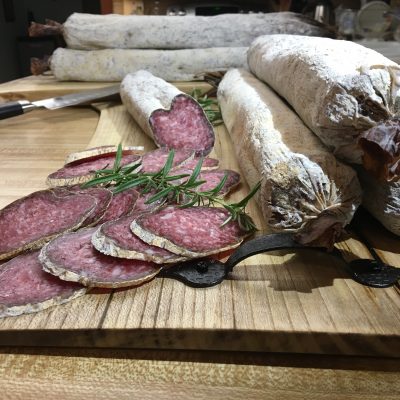
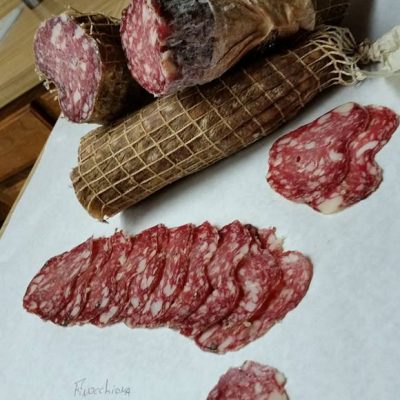
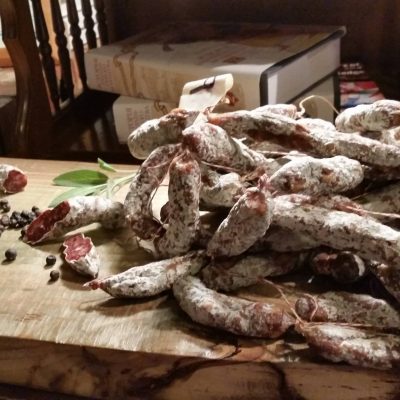
There are no comments yet
Or use one of these social networks